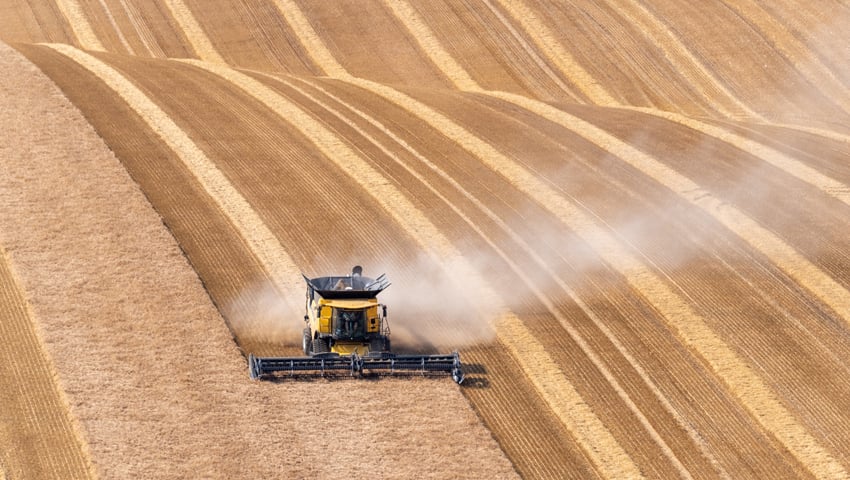THE Agricultural Industries Confederation (AIC) has used the findings of a major report to call for an independent Food Security Committee to be established to shore up the UK agri-food sector’s floundering productivity and sustainably bolster the nation’s food security.
The independent report “Powering Productivity for Sustainable UK Food Security”, was commissioned by AIC – the agricultural supply industry’s trade association – on its 20th anniversary, and recommends that a statutory body is set up to provide oversight of the uniquely complex nature of agricultural productivity and food security.
The independent report, authored by Dr Marcus Bellet-Travers of Anglia Ruskin University (ARU), was launched at the AIC Conference in Peterborough.
Robert Sheasby, AIC’s Chief Executive, said, “The unprecedented supply chain shocks of recent years exposed the fragility of the UK’s food supply and its deeply concerning lack of security.
“Productivity in the agri-food industry is complicated and no one policy or innovation drives its progression. It is the sheer breadth and complexity laid out by this report which has led AIC to call for the establishment of an independent UK Food Security Committee.”
Chaired independently, this statutory body would advise the UK and devolved governments on the drivers of food security and report to Parliament on progress made in enhancing the productivity and resilience of the UK’s entire agri-food supply chain – from pre-farm suppliers, farmers and growers, through to processors, manufacturers, food service and retailers.
Much like the independent Committee on Climate Change, it would take a cross-UK view of the legislative direction, aiding policy development and collaboration in support of our nation’s food security.
Mr Sheasby said, “The oversight of such a body for the agri-food industry will significantly enhance our national food security for the long term, well beyond short-term parliamentary cycles.
“Developing a clear strategy for food security would provide the certainty that businesses desperately need in order to invest in the UK, facilitating investment in Integrated Pest Management, Nitrogen Use Efficiency, as well as innovation in animal feed and precision breeding.
“AIC is encouraging the entire agri-food sector to back this report’s core recommendation and we look forward to collaborating with industry and government to make it happen.
“There is an open and serious question as to where our nation will find itself in the next 20 years if we fail to act now.”
The demand is set to form a central pillar of AIC’s lobbying efforts as it prepares for next year’s General Election.
Eleanor Kay, Senior Policy Adviser (Agriculture & Climate Change), Scottish Land & Estates said: “Scottish agricultural policy is on the cusp of significant change and ever-growing demands on land to deliver for food, the environment and society and this report from AIC arrives at a crucial time.
“Our ability to improve food security depends on there being sufficient production capacity, targeted research and development, and a clear understanding of the many expectations placed on land use throughout the UK.
“A UK land use strategy has the potential to join up the delivery of funding streams throughout the UK to achieve multiple objectives, and increase productivity alongside climate mitigation. It should also ensure that devolved governments receive the appropriate budget for their domestic policy in response to the wider strategy and UK international obligations. There are many lessons which can be learnt from the established Scottish Land Use Strategy and regional land use frameworks.”
Recommendations for enhancing UK food security
The UK would benefit from the oversight provided by a statutory body established by government to operate independently beyond short-term parliamentary cycles. This report therefore calls for the establishment of an independent UK Food Security Committee.
Such a body could advise the UK and devolved governments on national and strategic food security by taking account of the wide-ranging issues which determine agricultural productivity. It is this productivity which fundamentally underpins the nation’s food security.
Summary of actions
The key findings of this independent report culminate in the following recommendations to bolster the UK’s food security by enhancing agricultural productivity.
Land Use Strategy
Streamline government policies to create cross-departmental, comprehensive legislation that balances all facets of land management to ensure sustainable and secure food production.
Implement a government funding policy that maintains and improves sustainable food production within the UK while promoting dietary diversity.
Market Access
Expand both internal and external markets to enhance agri-food business resilience and food production security.
Technology, Data and Infrastructure
Encourage and legislate investment in technology, data solutions, and infrastructure to support sustainable business practices across the food supply system.
Research and Development
Promote interdisciplinary research to enhance the resilience, efficiency, and sustainability of production. Foster agricultural systems research that consolidates on-farm practices into transferable knowledge.
Training, Skills, and Advice
Develop training and education programs to equip the workforce with the skills needed for sustainable agricultural practices, including support for the proposed doctoral training centre for agricultural systems research.
Sustainability and Social Development
Support the development and adoption of sustainable practices in UK agriculture, encompassing social aspects.
